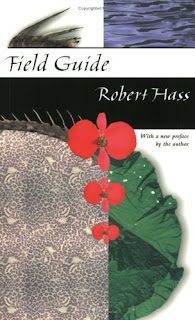Robert Hass, Field Guide, Human Wishes, Sun Under Wood and Time and Materials
 What is Hass's obsession with nipples?
What is Hass's obsession with nipples?I'm sorry, but I can't get past that question. Nipples recur in his poems with more than noticeable frequency. I don't know why, and frankly any attempt at a gloss will inevitably end up being hopelessly obtuse. The long poem titled "My Mother's Nipples" doesn't so much explain his fascination as extend it.
But more than nipples, Hass is concerned with the connection of man to nature. Yet I do not think it appropriate to call him a nature poet. Unlike John Clare, for instance, Hass's familiarity with the natural world seems second-hand, a little too directed—it is not for nothing that his first volume was called Field Guide. (A quintessential example of this second-hand feel is "The Woods in New Jersey" in Sun Under Wood.)
Possibly this distance is created by the softly cerebral pulse of his poetry—a smoothness that eschews visceral emotion even while it lacks the evasiveness of certain other post-confessional poets.
But I think rather it is a spatial question: Hass's poems use the natural world as a surface—beaches, fields, paths and streams. Humans exist on these elements of nature like skaters on ice. Men and women do not exist in nature; nature exists under them. Commingling of the two worlds are, therefore, the results of intrusion, as we see in the section of "In Weather" I posted earlier and in another poem describing the nocturnal infiltrations of small creatures, "Iowa City: Early April" in Sun Under Wood.
Hass's poetic genre is therefore more properly the eclogue—acknowledging this, Hass titled one of the poems in Human Wishes "Berkeley Eclogue." And like Vergil, Hass's Eclogues have political meaning. However, Hass also is clearly in a position which, unlike the imaginary swains which populated older instances of the form, allows him to be more indifferent to the natural world. Or to put it more finely, he is able to be intermittently attentive to the natural world, and he seems to value this ("It must be a gift of evolution that humans / Can't sustain wonder. We'd never have gotten up / From our knees if we could." "State of the Planet," Time and Materials).
The archness of these lines is more reminiscent of Horace than of Vergil, and Horace is indeed one of the poets Hass imitates in Time and Materials. Yet Hass does not write satires; an attempt ("Bush's War," Time and Materials) meanders far, far afield and never really touches its titular subject.
However, Hass's understanding of the relationship between the human and natural worlds as being a series of mutual intrusions is automatically politically active along three lines. Firstly, war as the intrusions of one nation (the US) into other nations. Secondly, capitalist environmental negligence as the intrusion of human values and rationality into a pristine "beauty unconscious of itself." And lastly, the invasions of white European settlers in the already populated lands of America, and particularly of California. The intrusions of animals or nature into the human world are puzzling but amusing to Hass, but the intrusions of humans into the natural world or into other parts of the human world are ineluctably deadly. Well, intrusions other than sex, apparently, although Hass still often configures the act as an intrusion, and that configuration, as with his position relative to nature, makes the subject seem to come at some distance, as if reconstructed and not remembered.
Comments
reading this post
was how deprived your blog
has been until now
of nipples.
please make an adjustment
in the future
as everything
is better
with nipples. no?